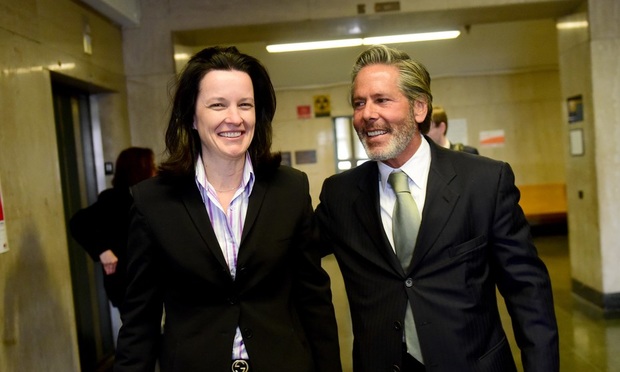ABA Rules Aim to Help Lawyers Boast Responsibly
“When you win big, you have to be out there,” says Seward & Kissel's Rita Glavin. But there are limits to using a win for one client to reel in others.
March 27, 2018 at 03:31 PM
3 minute read

There's no better marketing tactic for litigators than a big courtroom victory. But as a recent opinion by the American Bar Association's standing committee on ethics and professional responsibility makes clear, there are limits to using a win for one client in order to attract others.
Rita Glavin of Seward & Kissel knows that success can beget success. Glavin represented former Dewey & LeBoeuf executive director Stephen DiCarmine, winning his acquittal last year on charges that included securities fraud and conspiracy.
“When you win big, you have to be out there,” said Glavin, whose successful defense of DiCarmine prompted dozens of stories in the legal and the mainstream press. “Your name becomes much more well-known,” she said. “When clients are considering you, they know what your work has been.”
With existing clients, Glavin added, winning an acquittal like that “reinforces your credibility and skills.”
Lawyers should seize such victories as marketing opportunities, said Gina Rubel, CEO of Furia Rubel Communications. But they should follow some basic ground rules that have gotten more specific with the recent ABA opinion.
“If a lawyer comes to me and says we won this big case, and how should we capitalize on it, the very first thing if they are going to do any publicity they need is to have written consent from the client,” Rubel said.
The ABA ethics committee's March 6 opinion states that a client must give express or implied consent to disclose any information at all about a client matter or representation, even if the information is already part of the public record.
The opinion outlines how a lawyer's “public commentary” implicates three ethics rules: Rules 1.6 (confidentiality), 3.5 (impartiality/decorum of tribunal), and 3.6 (trial publicity). The ethics committee took a broad view on what should be considered public commentary, and included online publications, web postings, tweets, webinars, podcasts, and in printed magazines, white papers and law review articles.
Once lawyers have their clients' consent, however, they should talk or write publicly about the assignment—especially if it led to dropped charges or to an exoneration. By doing so, they are acting in the client's best interests, as well as marketing their own talents, Rubel said.
“Get the positive news out there as much as possible. They are helping clean up a digital footprint for their client,” she said.
White-collar criminal defense victories have particular potential for client development.
“Winning this case has definitely gotten me calls I wouldn't have gotten before,” said David Siegal, a New York partner at Haynes and Boone who successfully beat back civil and criminal fraud claims against Wall Street financier Benjamin Wey last year, and then won a related victory for Wey's sister this month.
“We beat not just the SEC but the Southern District prosecutors,” Siegal said.
Soon after the Justice Department dropped its case against Wey last August, Siegal's phone began ringing with prospective clients, he said. “I probably received six or seven calls, and I have added at least one significant client in the financial services business that probably is a seven-figure representation,” Siegal said.
Siegal said he's also been invited to speak frequently at events, including nationally. “It's not as if business has exploded, but there are intangible ways in which this win helps. People's confidence in referring matters has grown,” he said.
This content has been archived. It is available through our partners, LexisNexis® and Bloomberg Law.
To view this content, please continue to their sites.
Not a Lexis Subscriber?
Subscribe Now
Not a Bloomberg Law Subscriber?
Subscribe Now
NOT FOR REPRINT
© 2025 ALM Global, LLC, All Rights Reserved. Request academic re-use from www.copyright.com. All other uses, submit a request to [email protected]. For more information visit Asset & Logo Licensing.
You Might Like
View All

12-Partner Team 'Surprises' Atlanta Firm’s Leaders With Exit to Launch New Reed Smith Office
4 minute read
After Breakaway From FisherBroyles, Pierson Ferdinand Bills $75M in First Year
5 minute read
Trending Stories
- 1Bar Report - Jan. 20
- 2Saxton & Stump Lands Newly Retired Ex-Chief Judge From Middle District of Pa.
- 3Judicial Admissions and Medical Malpractice Defense
- 4South Florida Attorney Charged With Aggravated Battery After Incident in Prime Rib Line
- 5'A Death Sentence for TikTok'?: Litigators and Experts Weigh Impact of Potential Ban on Creators and Data Privacy
Who Got The Work
J. Brugh Lower of Gibbons has entered an appearance for industrial equipment supplier Devco Corporation in a pending trademark infringement lawsuit. The suit, accusing the defendant of selling knock-off Graco products, was filed Dec. 18 in New Jersey District Court by Rivkin Radler on behalf of Graco Inc. and Graco Minnesota. The case, assigned to U.S. District Judge Zahid N. Quraishi, is 3:24-cv-11294, Graco Inc. et al v. Devco Corporation.
Who Got The Work
Rebecca Maller-Stein and Kent A. Yalowitz of Arnold & Porter Kaye Scholer have entered their appearances for Hanaco Venture Capital and its executives, Lior Prosor and David Frankel, in a pending securities lawsuit. The action, filed on Dec. 24 in New York Southern District Court by Zell, Aron & Co. on behalf of Goldeneye Advisors, accuses the defendants of negligently and fraudulently managing the plaintiff's $1 million investment. The case, assigned to U.S. District Judge Vernon S. Broderick, is 1:24-cv-09918, Goldeneye Advisors, LLC v. Hanaco Venture Capital, Ltd. et al.
Who Got The Work
Attorneys from A&O Shearman has stepped in as defense counsel for Toronto-Dominion Bank and other defendants in a pending securities class action. The suit, filed Dec. 11 in New York Southern District Court by Bleichmar Fonti & Auld, accuses the defendants of concealing the bank's 'pervasive' deficiencies in regards to its compliance with the Bank Secrecy Act and the quality of its anti-money laundering controls. The case, assigned to U.S. District Judge Arun Subramanian, is 1:24-cv-09445, Gonzalez v. The Toronto-Dominion Bank et al.
Who Got The Work
Crown Castle International, a Pennsylvania company providing shared communications infrastructure, has turned to Luke D. Wolf of Gordon Rees Scully Mansukhani to fend off a pending breach-of-contract lawsuit. The court action, filed Nov. 25 in Michigan Eastern District Court by Hooper Hathaway PC on behalf of The Town Residences LLC, accuses Crown Castle of failing to transfer approximately $30,000 in utility payments from T-Mobile in breach of a roof-top lease and assignment agreement. The case, assigned to U.S. District Judge Susan K. Declercq, is 2:24-cv-13131, The Town Residences LLC v. T-Mobile US, Inc. et al.
Who Got The Work
Wilfred P. Coronato and Daniel M. Schwartz of McCarter & English have stepped in as defense counsel to Electrolux Home Products Inc. in a pending product liability lawsuit. The court action, filed Nov. 26 in New York Eastern District Court by Poulos Lopiccolo PC and Nagel Rice LLP on behalf of David Stern, alleges that the defendant's refrigerators’ drawers and shelving repeatedly break and fall apart within months after purchase. The case, assigned to U.S. District Judge Joan M. Azrack, is 2:24-cv-08204, Stern v. Electrolux Home Products, Inc.
Featured Firms
Law Offices of Gary Martin Hays & Associates, P.C.
(470) 294-1674
Law Offices of Mark E. Salomone
(857) 444-6468
Smith & Hassler
(713) 739-1250









